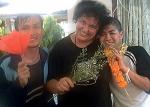“Ali And Nino” and “The Orientalist”
“Ali and Nino” by Kurban Said
An Azeri Muslim boy from Baku and a Georgian Greek Orthodox girl marry during the turmoil just before the Russian take-over of the Caucasus.
“The Orientalist” by Tom Reiss published 2005
The author goes on the trail of the identity of Kurban Said and with it we get a cultural and geopolitical history of the Caucasus and travel and sleuthing detective stories to boot. NYT Book Review of the Year. Wonderful reading! All I never knew about the world where Asia and Europe meet. The travels of the real author of the novel Ali & Nino “unlocks a parallel history of totalitarianism, Jewish identities and the West’s misunderstanding of the ideas of the East at a time when the Nobel’s and the Rothchilds were getting rich supplying half the world with oil. Now I am dreaming about going to Baku!
The one is a short novel called “Ali And Nino” by one Kurban Said that was first published in German in 1937. It would be nice to read this novel first but the most fascinating and informational was a biography of “Kurban Said” called “The Orientalist” published in 2005 by Tom Reiss which became the NYT Book Review of the Year.
Reiss spends several years tracking down the identity of Kurban Said. It is the true story of a Jew, Lev Nussimbaum, who grew up in Baku Azerbaijan in a wealthy family who made their money in oil at a time when the Nobels sparked a technical revolution in oil extraction, refining and transportation. (The Nobels developed the first pipelines, first railway oil tankers, first storage tanks, and many other firsts. Within a very short time, a new industrial suburb grew up in Baku centering around the Nobel-owned refineries.)
Lev grew up hating and fearing the Russian Revolution which destroyed the world of his childhood and his family (the Bolsheviks took their wealth and made their home into their headquarters) and came to believe that no injustice was greater than the Revolution itself. On the eve of the Revolution, Lev’s family, along with many other Jews (many from Russia) fled across Central Asia for Constantinople and then Berlin in the face of German, Bolshevik and Turk threats. He joined the literary community there and then went on to Vienna and finally fascist Italy where he died and was buried in his 30’s.
Some of this is extracted from the study notes in the back of the book because it explains things better than I could:
“Lev came to feel that his lost world of Caucasian tribes and Moorish synagogues was more real to him than contemporary Judaism or secular culture” so he transformed himself into an Orientalist desert Muslim in Nazi Germany (Berlin.)
“As a young man Lev insisted that his father, Abraham Nussimbaum, was a Muslim lord, even though his circle in Berlin and Vienna knew that he was a penniless Jewish refugee. He would become furious at friends who mocked his conversion to Islam while he joked of his Jewishness himself.”
Under the name of Esaad Bey, he wrote controversial several autobiographical pieces changing details as he wrote…the first one at the age of 24. He wrote Allah Is Great; Blood and Oil in the Orient; Mohammed: A Biography; OGPU: The Plot Against the World; Stalin: Career of a Fanatic; Twelve Secrets of the Caucasus; White Russia; Men Without a Homeland.
As opposed to Edward Said’s book “Orientalism” that presented the idea in a negative light, “Lev presents Orientalism not as a means of colonizing and control but as a means of escape and self discovery” and became famous at the time because he could explain the east to the west.
Along the way we get “monarchist dreamers and Caucasian fantasists wandering around 1930’s Europe seeing a landscape different landscape than the one we see now.” We get history fleshed out, little details like Hitler cribbing his Sieg Heil! chant from an old Harvard football cheer and the fact that Hitler’s PR person in his first election campaign was a Harvard graduate. We find out that Nazism didn’t always mean anti-semitic and that fascist Italy didn’t become anti-semitic until well into Mussolini’s reign.
The book reads like the best detective novel you ever read and demolishes any stereotypes you have ever had about neat historical categories and what it meant to be a Jew in that time. What we are seeing today is, as has been mentioned, the following generations of Jewish families… many who harbor diverse identities.


Leave a Reply